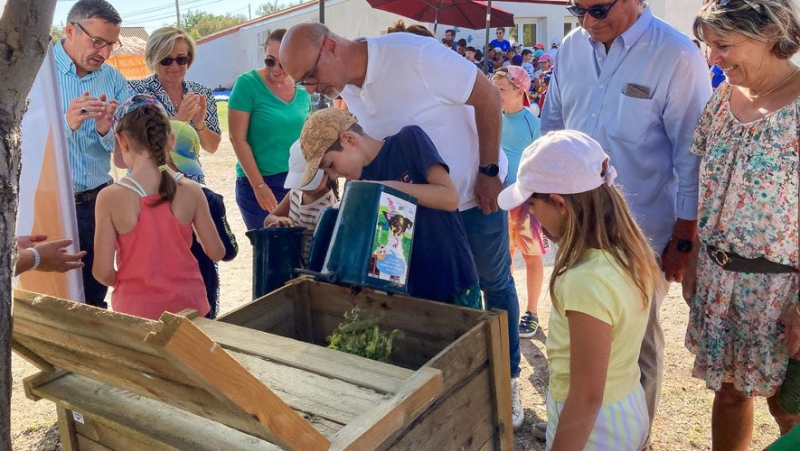Thau basin agglomeration: it’s time to think about sorting your food waste

L’objectif est de réduire de 30 % le volume de déchets ménagers non valorisés sur le territoire de l’Agglo du bassin de Thau. DR
La loi française oblige les collectivités à mettre en place des dispositifs pour le tri des biodéchets des particuliers. Où en est l’Agglo du bassin de Thau?
As of January 1, 2024, in accordance with the Agec anti-waste law of 2020, communities are required to offer their residents a solution for sorting biowaste at the source (leftover meals, peelings, shells of ;rsquo;egg, etc.), so that this waste can be recovered. This involves reducing the volume of household waste (30%) while providing useful compost for soil fertilization.
All residents of the Thau Archipelago are therefore encouraged (not obliged) to recycle their food waste. Whether they live in a single house or an apartment. Several methods are already possible. And ongoing reflections within the Agglo.
1. 9,500 households already compost at home
The possibility of composting at home has existed on the territory of the Agglo since 2017. It is, in fact, possible to equip yourself with a wooden garden composter which transforms plants and organic waste into compost . They can be collected free of charge from the Oïkos sorting center in Villeveyrac or from the seven recycling centers in the Bassin de Thau area. According to figures revealed by the Agglo, 9,500 homes are already equipped. Data to report to the 130,000 inhabitants of the territory, among whom 50% live in individual housing, or 65,000 people, including 32,000 in individual houses."If we were perfect, we would need one composter per house, so 32 000!, summarizes Laurence Magne, actress in the file as elected official in charge at the town hall of Sète and vice-president of the Agglo in charge of waste recovery. But we plan to deploy 10,000 over five years. The Agglo has chosen reuse and will launch, via a local company, the manufacture of 2,500 bins made of recycled materials: wood recovered from recycling centers.
2. Collective composting, particularly in urban areas
If you live in collective housing, in an urban area, it is entirely possible to compost. Your trustee can request a bin for 10 to 15 families (free with shredded material, read below) which can be installed in a green space in your residence.
Compost, how does it work ?
A composter must be placed outside, in direct contact with the earth. Under the effect of oxygen and humidity, micro-organisms (bacteria, fungi) and insects, organic matter decomposes. Boyat (dry matter made from dead leaves or wood) must be added to control the humidity level and ventilate regularly, to prevent odors and midges. Vegetable peelings, fresh plants, meat scraps, coffee grounds, tea bags and eggshells can be added to the compost bin. For any questions, call the Agglo Environmental Education department on 04 67 46 25 53 or contact by email educenvironnement@agglopole.fr.
But to accelerate the movement of recycling biowaste, particularly among those who do not have outdoor spaces (private apartments or unequipped residences), nearly 50 collective areas have been created in the space public at the request of associations or municipalities (within school groups, shared gardens, residential neighborhoods, for example) of the Agglomeration. Their development should accelerate in 2024. A "composer referent" is designated each time to ensure the proper functioning of the equipment and inform the public (residents, association members, etc.). "This can also go through the neighborhood councils, we are delighted that the Barrou council has contacted us, they really want to get involved", notes Laurence Magne. For future residences, the building permit will include the terms and conditions for installing a composter.
3. A collection from individuals for reflection
L’Agglo has given up distributing individual worm composters for balconies. "It’s not pleasant to have worms at home, in the summer there are strong odors, there have been too many failures, summarizes Laurence Magne. For people living in private apartments, we don’t want to rush. We have two technical solutions under study, confirms the elected official. The installation of voluntary drop-off points throughout the city (PAV) with regular collection. "It’s not easy for people to make this effort even 200 m from home, we saw it in Perpignan. And then the bins generate odors and you have to clean them often with plenty of water. Another solution will be tested. Throw away your food waste in an orange plastic bag specially distributed by the municipalities, which will be added to the traditional household waste collection. But once at the Sète energy recovery unit (incinerator), an optically reading sorting belt identifies the orange bag which would be separated from other waste to be able to reduce its compost content. Renting the optical reading mat could cost between 2 and 3 million euros. Technicians, elected officials and associations are working to establish the strategy during the first half of 2024. "We want to be careful, we are only at the beginning of the story. We don't want tax prices to explode. We must find the right balance between economy and ecology.
I subscribe to read more




